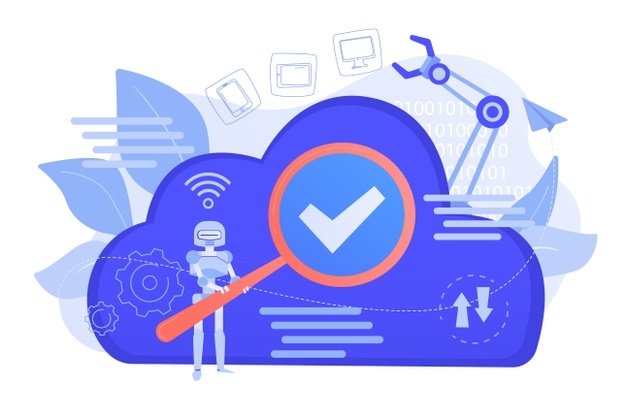Cloud Neutrality
3AI January 6, 2021

A multibillion-dollar, privately-owned infrastructure is now essential to the modern internet economy. That should freak you out.
WE SPENT A lot of years talking about net neutrality—the idea that the companies that provide access to the internet shouldn’t unfairly block, slow down, or otherwise interfere with traffic even if that traffic competes with their services. But there’s an even bigger issue brewing, and it’s time to start talking about it: cloud neutrality.
“While its name sounds soft and fluffy,” Microsoft president and general counsel Brad Smith and coauthor Carol Ann Browne write in their recent book, Tools and Weapons: The Promise and the Peril of the Digital Age, “in truth the cloud is a fortress.” Their introduction describes the modern marvel of the data center: a 2 million-square-foot, climate-controlled facility made up of colossal electrical generators, diesel fuel tanks, battery arrays, and bulletproof doors. At its center is what they call a “temple to the information age and cornerstone of our digital lives”: thousands of machines connected to the fastest possible internet connections, providing offsite storage and computing power to businesses that otherwise couldn’t possibly afford the hardware for all that storage and computing power.
Smith and Browne note cheerfully that Microsoft operates or leases more than 100 such facilities in 20-plus countries and hosts at least 200 online services. Each data center costs hundreds of millions of dollars to build and many millions more to maintain; and you pretty much can’t build a successful new company without them. So, thank goodness for Microsoft, right?
The book means to portray this might and power as both a source of wonder and an enabling feature of the modern economy. To me, it reads like a threat. The cloud economy exists at the pleasure, and continued profit, of a handful of companies.
The internet is no longer the essential enabler of the tech economy. That title now belongs to the cloud. But the infrastructure of the internet, at least, was publicly financed and subsidized. The government can set rules about how companies have to interact with their customers. Whether and how it sets and enforces those rules isn’t the point, for now. It can.
That’s not the case with the cloud. This infrastructure is solely owned by a handful of companies with hardly any oversight. The potential for abuse is huge, whether it’s through trade-secret snooping or the outright blocking, slowing, or hampering of transmission. No one seems to be thinking about what could happen if these behemoths decide it’s against their interests to have all these barnacles on their flanks. They should be.
Almost every modern tech company is paying to outsource its storage and computing services, either all or in part, to the cloud. This setup allows startups to emerge with very little overhead, and huge companies to run more efficiently by avoiding investment in physical hardware. It has spawned a generation of companies that plan to use the cloud to offer everything as a service.
But turn that transaction around, and you realize that the companies that actually built and operate the cloud are essentially incubating and hosting their competition. One easy example? Netflix runs its streaming video product on the cloud-based Amazon Web Services; indeed, it was widely praised for saving money by going “all in” on AWS in 2009 and 2010. Amazon started its own streaming service in 2011. The two have coexisted for a decade now, but how long will the famously ruthless Amazon tolerate that situation?
The problem is that few have the resources to replicate the cloud infrastructure, should the landlords suddenly turn on their tenants.
The big three cloud providers in the world are Amazon, Google, and Microsoft. They’ve collectively spent tens of billions of dollars on data center infrastructure. And to be clear, they have profited handsomely from those investments. Just last week, in fact, Alphabet revealed its cloud services revenue for the first time: it accounts for nearly $9 billion of the company’s $37.57 billion in quarterly earnings, up more than 50 percent from 2018. Amazon’s AWS business made almost $10 billion, and Microsoft’s Azure business made almost $12 billion. Cloud computing was a $141 billion market in 2018.
Those numbers are a great incentive for cloud providers to play nice with all the companies they service. Still, there’s every reason for the tenants to start thinking about their vulnerability. There are some ways to ameliorate the risks. To geek out on enterprise computing news for a minute, the biggest trend in cloud services lately is the “hybrid cloud,” wherein companies control a portion of their own infrastructure and lease the rest. This could help protect organizations with the resources to insource some of their infrastructure. But it’s not enough. Given how critical the cloud has become for a huge swath of the tech economy, maybe we should ask ourselves whether this infrastructure should be in the hands of a few trillion-dollar companies.
I had the chance to ask Microsoft’s Brad Smith about this concern before an onstage interview recently, just to test the thesis. He allowed that the potential for abuse absolutely exists, even if it’s not in the hosting companies’ financial interest to mess with their customers at the moment. Consider where things are heading, though: Control of the market for cloud services—and the means of competition—is consolidating under the handful of tech giants that have enough money to blanket the globe with data centers.
I admit that it’s hard to imagine what a set of cloud-neutrality regulations might look like. After all, this is kind of an unprecedented situation. It would be as though Ford, GM, and Toyota had built the Interstate Highway System using private dollars and then charged tolls to other carmakers to use it.
Capitalism, and perhaps the threat of even more antitrust investigations, might keep everyone in line in the short term; but cloud-based companies are still leasing space in a dragon’s cave. Should Alphabet, Amazon, and Microsoft hit on another, better way to make money, then the laws of nature will inevitably take over: Those fledglings will be devoured
Picture from freepik.com





